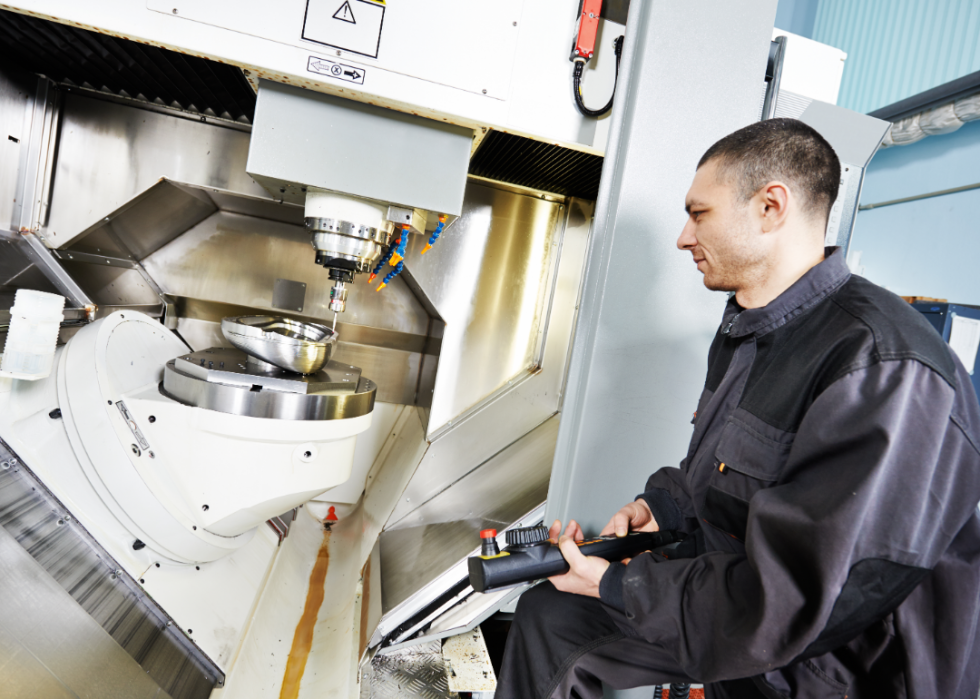
The 50 highest-earning 2-year degrees
It's no secret that the cost of college in America is skyrocketing. According to a July 2025 Bankrate report, four-year public universities cost out-of-state students $30,780 annually. Add in expenses like housing, transportation, and other supplies, and that number goes up to $49,080. That's to say nothing of private institutions, where—with those extra expenses included—students could be looking at $62,990 annually.
Think that's a lot? Elite institutions are even worse, and as the Class of 2029 is learning, costs continue to rise. The University of Pennsylvania, for example, raised undergraduate tuition by 3.7% for the 2025-2026 academic year, bumping up the total cost to $91,112. Duke University increased tuition by an even more daunting 5.93%, resulting in a $92,042 price tag. Sticker shock feels like an understatement.
These numbers make it easy to see why a four-year college degree is simply out of the question for many Americans. High school graduates are unwilling to take on the lifetime of debt the degree would bring, or lack the resources to attend public or private universities without taking out loans.
Luckily, a four-year degree isn't the only higher education option. Plenty of colleges offer two-year programs at a much more affordable rate. While associate degrees don't improve earning prospects as much as bachelor's degrees, they still increase job stability and wages.
Here, Stacker has compiled a list of the 50 associate degrees that earn the most money, using data from PayScale. Degrees are ranked by mid-career pay (as of 2021).
So before you commit to a four-year program, read on to discover your other, cheaper options.

#50. Economics (tie)
- Early career pay: $36,400
- Mid-career pay: $73,400
Economics is the study of data pertaining to the production, distribution, and consumption of goods and services. Typical jobs that follow this course of study include economist, financial adviser, and investment banker. However, those careers all require a bachelor's degree for entry-level roles. Those who hold an associate degree may work as assistants to these individuals, in related fields, or may use their degree as a stepping stone to pursuing higher education.

#50. Electrical and electronics engineering (tie)
- Early career pay: $45,000
- Mid-career pay: $73,400
Electrical and electronics engineering focuses on the construction, optimization, and maintenance of electrical components, devices, and systems. A four-year degree is required to obtain full status as an electrical or electronics engineer, but those who stop after two years of study can find work as electronics engineering technicians, assisting on projects rather than leading them.

#50. Mechanical engineering (tie)
- Early career pay: $44,000
- Mid-career pay: $73,400
In the course of a two-year mechanical engineering program, students will learn about the entire cycle of bringing a mechanical project to life, from conception to manufacturing. This STEM program often places a heavy emphasis on the sciences, computer programming, and mathematics. Popular jobs in the field include laboratory technician, technical sales representative, draftsman, and product designer.

#50. Manufacturing engineering (tie)
- Early career pay: $47,600
- Mid-career pay: $73,400
Manufacturing engineers work out the concepts and designs for systems and technologies that make manufacturing processes faster and more economically viable. They work alongside manufacturing engineering technicians, who do the more hands-on work of physically putting these systems together.

#46. Robotics and automation
- Early career pay: $50,200
- Mid-career pay: $73,500
Robotics and automation students are responsible for innovating and creating the robots and automatic systems that have come to rule so much of the world around us. Those who earn associate degrees in the subject learn how to install, troubleshoot, and test these robots by taking courses in technical mathematics and computing, digital electronics, engineering, and programmable controls. Upon graduation, many of these students take jobs as robotics technicians or manufacturing technicians in spheres like defense, space, and construction.

#45. Nursing science (tie)
- Early career pay: $57,800
- Mid-career pay: $74,100
There are two possible degrees a nursing science graduate could hold at the associate level: associate of science degree in nursing (ASN) or associate of applied science in nursing (AAS). Except for one or two courses, the degrees are essentially identical, and provide the same career opportunities as an associate degree in nursing (ADN) upon completion of the NCLEX exam.

#45. Electromechanical engineering (tie)
- Early career pay: $47,100
- Mid-career pay: $74,100
By combining electrical engineering and mechanical engineering studies, electromechanical engineering works to design machinery that can be controlled by electricity (for example, unmanned offshore oil drilling equipment). While a bachelor's degree is required to be a full-blown electromechanical engineer, those who hold an associate degree in the subject can readily find technician jobs in electricity, electronic, or mechanical engineering fields.

#45. Echocardiography (tie)
- Early career pay: $57,800
- Mid-career pay: $74,100
Echocardiography uses ultrasound waves to take images of the heart to obtain an overall picture of an individual's heart health. While in school, students learn how to use ultrasound technology, capture images of the heart, and give EKG exams. After finishing their programs, echocardiography students can either become cardiac sonographers or EKG technicians.

#45. Computer science (tie)
- Early career pay: $43,000
- Mid-career pay: $74,100
A computer science program should train students in four main topics needed to program and maintain computers: algorithms, programming languages, theory, and architecture. While many of these subjects can be learned independently online, most companies prefer to hire formally educated applicants. When it comes to landing a job, many former computer science majors end up working as computer programmers, computer systems analysts, or computer support specialists.

#45. Business and information technology (tie)
- Early career pay: $34,600
- Mid-career pay: $74,100
A business and information technology degree is more focused than a simple information technology degree, which accounts for the significant bump in pay. In this field of study, students acquire the basic computer knowledge one needs to know to run a business effectively. Topics individual programs cover typically include database management, business math, desktop publishing, and IT skills.

#45. Process technology (tie)
- Early career pay: $54,100
- Mid-career pay: $74,100
Process technology is the art of extracting natural chemicals, like gas and oil, and processing or refining them for use in everyday life. Process technology is used in a host of industries, from power to waste to pharmacology. The field is expected to grow in the coming years, leaving accredited graduates with their pick of career opportunities.

#39. Civil engineering
- Early career pay: $38,600
- Mid-career pay: $74,200
Arguably the oldest form of engineering, civil engineering deals with the creation of our built environment (aka homes and shared buildings, as well as bridges, roadways, sanitation systems, and water supply systems). While a higher level of education may be required to be a chief engineer on a project, graduates with an associates degree in civil engineering can work on transportation, hydraulic, sanitation, and geo-technical projects. They can also find work as compliance officers and construction managers.

#38. Web development
- Early career pay: $47,800
- Mid-career pay: $74,400
A two-year degree with huge potential growth, the U.S. Bureau of Labor Statistics predicts that web development hiring will increase by 13% from 2018 to 2028, far above the average for all occupations. The role of web development professionals is to create websites for clients, which requires them to have a mix of technical and creative skills, and strong communication abilities.

#37. Construction trades
- Early career pay: $46,400
- Mid-career pay: $74,500
A more general degree than either construction technology or construction engineering technology, construction trades allows students the opportunity to focus on learning in a particular arena, like construction management or electrical and power transmission installment. Alongside the classroom learning, many colleges require students to complete an apprenticeship, where they can learn the tricks of the trade first hand.

#36. Construction engineering technology
- Early career pay: $42,000
- Mid-career pay: $74,600
Construction engineering technology programs prepare students for a more administrative role in the construction process than do construction technology programs. In a two-year program of this nature, students will learn about scheduling builds, estimating costs, and other skills necessary to oversee a project. With this degree, you can find work in contracting companies, building agencies, or architectural firms as field supervisors, job superintendents, or safety specialists.

#35. Chemical engineering
- Early career pay: $38,500
- Mid-career pay: $74,800
A chemical engineer works to create artificial chemicals, refine naturally occurring chemical compounds, and process chemicals into products. The coursework for this major is understandably very science-heavy, and requires several chemistry classes. Associate-level graduates can hold jobs as chemical technicians, working under certified chemical engineers.

#34. Dental hygiene
- Early career pay: $66,200
- Mid-career pay: $74,900
Courses included in a dental hygiene program include basic sciences like anatomy and physiology, clinical sciences like dental hygiene and dental materials, as well as clinical hours where qualified instructors supervise students. Upon the completion of the two-year program, students may take the National Board Dental Hygiene Examination. If they pass, they are certified and free to work under dentists in all types of settings.

#33. Computer science and engineering
- Early career pay: $41,200
- Mid-career pay: $75,000
A field of study that integrates computer engineering and computer science, computer science and engineering covers various topics, from programming languages and design to hardware construction and algorithms. While this particular subject isn't offered at every college, those who do complete the degree have a future in software design and development or networking and security administration.

#32. Telecommunications technology (tie)
- Early career pay: $37,500
- Mid-career pay: $75,100
A telecommunications technology program equips students with the necessary skills to install, run, manage, and repair communication systems like the telephone and radio. A practical rather than a conceptual course of study, telecommunications technology students become line installers and repairers, telecommunication equipment installers, and electronic equipment repairers.

#32. Philosophy (tie)
- Early career pay: $33,600
- Mid-career pay: $75,100
Philosophy, or the examination of mankind's most elemental and existential questions through critical thinking, is one of the oldest courses of study in the world. While simply being a philosopher isn't really a thing in our modern-day civilization, those who hold associate degrees in the subject can start a career in almost any field they want, from business to law to education to nonprofit work.

#30. Power plant technology (tie)
- Early career pay: $56,500
- Mid-career pay: $75,300
Power plants can be fueled by coal, water, nuclear energy, electricity, and renewable energy. Students enrolled in a power plant technology program will learn the fundamentals of all of these energy sources and the basics of pollution control systems. Once they've finished school, most of these students will pursue work as power plant operators.

#30. Construction project management (tie)
- Early career pay: $43,400
- Mid-career pay: $75,300
The vast majority of the content covered in a construction management degree and a construction project management degree is the same. Not many colleges and vocational schools offer construction project management degrees, with most organizations sticking to classic construction management. Upon graduation, construction project managers are capable of overseeing projects from planning and design to completion of the build.

#28. Engineering
- Early career pay: $41,700
- Mid-career pay: $75,500
An associate degree in engineering is the best option for an individual who wants to get into the field but has no idea which particular branch they'd like to pursue. The coursework will introduce them to basic engineering concepts, a variety of sciences and mathematics, and beginner-level computer programming. Upon graduation, you'd have all the necessary qualifications to work as an engineering technician, and would be perfectly poised to pursue further education in a more narrow vein of study.

#27. Electrical engineering technology
- Early career pay: $44,500
- Mid-career pay: $75,800
An electrical engineering technology degree is perfect for the individual who wants to go straight to work after finishing their education. These programs teach the basics of designing, maintaining, and installing electrical systems, perfectly priming students for entry-level jobs as electrical engineering technicians. As they gain more experience on the job, employees can establish a specialization in industries like manufacturing or power generation.

#26. Nuclear medicine technology
- Early career pay: $60,700
- Mid-career pay: $76,100
A nuclear medicine technologist is a health care professional who gives patients small doses of radioactive drugs, and then uses imaging equipment to take pictures of the brain and other internal organs to diagnose any abnormalities. Certification is required for employment, but associate degree programs teach you everything you need to know to ace these tests.

#25. Aviation (tie)
- Early career pay: $47,800
- Mid-career pay: $76,200
The first step towards a career in the aviation industry, an associate degree in aviation can prepare you for multiple job paths. These programs are designed to give you the basic knowledge necessary to take pilot licensing and air traffic controller exams, or to take on more corporate roles like that of an airline manager. It's important to note that higher-education aviation programs can often have different focuses. Significant research must be done before enrolling to ensure that the program you have in mind will help you meet your specific goal.

#25. Cardiovascular ultrasound (tie)
- Early career pay: $55,400
- Mid-career pay: $76,200
Essentially doing the same job as a cardiac sonographer, cardiovascular ultrasound technicians undergo the same equipment and patient training as their co-workers. The only difference between the two positions is that cardiovascular ultrasound technicians are additionally trained in recording and analyzing information about the blood vessels and blood flow, and can sit for an additional licensing exam.

#25. Computer aided design (tie)
- Early career pay: $41,900
- Mid-career pay: $76,200
Obtaining a degree in computer aided design leads to a number of career pathways for graduates, the most popular among them being drafters and engineering technicians. The two-year program teaches students the basics of design as well as how to use a specific computer program to easily complete and better optimize these designs.

#22. Electrical and computer engineering (tie)
- Early career pay: $42,100
- Mid-career pay: $77,100
Yet another way to get your foot in the door of the engineering and computing worlds, this compound degree focuses on the overlap between electrical circuits and computing technology. Individuals in this field are usually leading the charge in developing new technologies and designing new products (like the electrical and computer engineers behind the iPhone more than a decade ago). As with all associate engineering degrees, graduates are qualified to be electrical and computer engineering technicians and are primed to pursue more education in the field.

#22. Information technology management (tie)
- Early career pay: $43,800
- Mid-career pay: $77,100
An information technology manager spends their days monitoring and administering an organization's information technology (aka its hardware—like computers—software, and data). These programs typically place a significant amount of emphasis on project management and leadership skills, and graduates can find employment as security analysts, computer systems analysts, and database administrators among other things.

#20. Nuclear medicine (tie)
- Early career pay: $62,600
- Mid-career pay: $77,300
Nuclear medicine technologists, who hold a two-year degree, are responsible for preparing and administering radioactive drugs for imaging and disease therapy. Most often working in hospitals, clinics, and imaging centers, these individuals take basic medical courses in the classroom and spend time in a clinical setting before graduating.

#20. Diagnostic medical ultrasound (tie)
- Early career pay: $53,300
- Mid-career pay: $77,300
Diagnostic medical ultrasound is an umbrella term for the line of medical work that uses ultrasound waves to assess and identify various medical conditions. As we've already discussed, students can be trained to take ultrasounds of the heart and blood vessels. This technology can also be used to check for pregnancy and musculoskeletal problems and to identify masses in the abdomen and breast. Graduates who hold an associate degree in this subject will be trained to run all of those tests, and be educated in the necessary science and appropriate bedside manner.

#20. Construction management (tie)
- Early career pay: $45,200
- Mid-career pay: $77,300
Construction projects, regardless of their size, are expensive endeavors that require effective management to ensure they're completed on time and budget. Graduates with an associate degree in construction management are the perfect people to lead these costly projects. They're able to apply their knowledge of financial accounting, construction safety, and construction costs to the task at hand. Beyond taking charge of individual builds, construction managers can work as land developers, land use planners, and construction contractors.

#17. Industrial design
- Early career pay: $45,900
- Mid-career pay: $77,500
As opposed to industrial engineering, industrial design is focused on an individual product rather than the production process. Industrial designers develop products for manufacture or seek to improve upon existing products, blending their artistic abilities with their problem-solving skills. Industrial designers will most often work for a design firm, although they will occasionally find employment in an engineering or architecture firm.

#16. Occupational health and safety
- Early career pay: $50,200
- Mid-career pay: $77,800
As opposed to many of the frontline workers on this list, occupational health and safety professionals work largely behind the scenes. Their primary job is to ensure that workplaces are clear of any potential dangers—they identify workplace hazards, ensure all state and federal safety regulations are being adhered to, and enforce the running of any necessary health programs. The day-to-day work varies wildly depending on the industry these professionals find themselves in. Many companies will pay a steep price to ensure they won't be shut down over safety concerns.

#15. Management information systems
- Early career pay: $45,400
- Mid-career pay: $78,400
The U.S. Bureau of Labor Statistics predicts there will be almost 50,000 new information systems management jobs available by 2028, as more and more companies seek to digitize their business. A degree in the management of information systems teaches students everything they need to know about telecommunication networks, system design, and cybersecurity, so that they can land positions as information technology managers and architects or, in some cases, software developers.

#14. Electrical engineering
- Early career pay: $45,400
- Mid-career pay: $78,700
Electrical engineering deals with electricity technology, from tiny microchips to massive robots. Early pioneers in the field, like Thomas Edison and Nikola Tesla, did the same work that modern electrical engineers do: design, test, and repair assorted electrical equipment. Associate degree holders in this profession can work as electrical engineering technicians.

#13. Biomedical engineering technology
- Early career pay: $49,500
- Mid-career pay: $78,900
Focusing on the science and function of medical equipment, a biomedical engineering technology degree sets up students for a hands-on career selecting and installing medical equipment for patients. Additionally, graduates may be trained in maintenance and inspection procedures. These technicians always work under the supervision of a physician.

#12. Instrumentation and control
- Early career pay: $57,400
- Mid-career pay: $80,700
A complex branch of engineering, instrumentation and control seeks to find ways to analyze, process, and control variables that come up in manufacturing by using different tools. This type of engineering is essential in all industrial and manufacturing industries, as production must be optimized and safe. Those who hold associate degrees in this field can work as technicians or assistants, and are primed to pursue further education.

#11. Network engineering
- Early career pay: $50,000
- Mid-career pay: $81,300
An associate degree program in network engineering prepares students to handle and secure computer network infrastructures competently. They gain skills in maintaining client systems and servers; configuring and troubleshooting WANs, LANs, and intranets; and troubleshooting software and hardware on individual devices. The growth in this industry is expected to be about 5% over the next decade, according to the U.S. Bureau of Labor Statistics.

#10. Biomedical engineering
- Early career pay: $44,900
- Mid-career pay: $81,800
Biomedical engineering is another course of study that focuses on the science and function of medical equipment. This particular vein of study gets more into the conceptualization and design of these devices, which can diagnose illnesses and improve patient's health. That being said, a four-year bachelor's degree is required to work as a full-blown engineer. Without additional education, associate degree holders are limited to the path of a biomedical engineering technician.

#9. Instrumentation technology
- Early career pay: $47,800
- Mid-career pay: $82,400
In an instrumentation technology program, students learn how to measure variables, calibrate machines, and how to program machinery to regulate itself automatically. After graduation, these individuals are often employed by manufacturing plants to ensure machines are running as effectively as possible, and make any necessary repairs.

#8. Applied computer science
- Early career pay: $41,800
- Mid-career pay: $84,500
A fairly new program, created in response to businesses' needs for more focused IT-professionals, applied computer science degrees teach students about the technical aspects of computer programming while largely bypassing the theoretical aspects of the discipline. Graduates tend to be well-rounded in their knowledge, but don't typically have a specialization like many standard computer science graduates do. After obtaining a two-year degree in this field, one can work in web development, software development, or cybersecurity.

#7. Project management
- Early career pay: $49,200
- Mid-career pay: $84,700
The Project Management Institute (PMI) is responsible for creating the curriculum that most project management programs follow. The coursework includes classes on time management, project planning, and leadership. Graduates are poised for leadership positions within organizations, including roles like supply chain manager, business project leader, and wholesale project manager.

#6. Instrumentation and control engineering
- Early career pay: $54,000
- Mid-career pay: $85,400
Instrumentation and control engineers are responsible for designing the technical components of manufacturing and production systems. Students who undertake this course of study will learn how to develop system codes and analyze program languages alongside a host of other technical skills that enable them to tell computers and machines how to make a product. It is important to note that growth in this highly skilled field is expected to be slow (2%) over the next decade.

#5. Computer science and mathematics
- Early career pay: $41,300
- Mid-career pay: $85,900
An associate degree in computer science and math combines two separate but complementary studies, to make students more employable with a more well-rounded knowledge base. Many of the same opportunities are open to these graduates as are open to computer science graduates, namely computer programmer, computer systems analyst, and computer support specialist.

#4. Software engineering
- Early career pay: $50,600
- Mid-career pay: $89,600
An associate-level software engineering program equips students with the technical knowledge necessary to develop and troubleshoot all types of applications and systems. During their two years of school, learners will take classes on security, web design, network structure, and coding. After finishing school, popular career paths include web development, database administration, and software engineering technician.

#3. Advertising and marketing communications
- Early career pay: $36,400
- Mid-career pay: $90,000
Two-year degrees in advertising and marketing communications allow graduates to contribute to all aspects of advertising and promotions from designing campaigns to working on press releases to crafting special events. The U.S Bureau of Labor Statistics predicts that growth in this field, particularly for those in a managerial position, will grow by 6% over the next decade—faster than other fields—making this line of work and study an excellent choice for those seeking stability.

#2. Radiation therapy
- Early career pay: $62,300
- Mid-career pay: $92,600
A radiation therapist works under a radiologist to administer radiation treatments, locate tumors, and update patient's charts and treatment plans. A two-year degree will impart all the theoretical and clinical knowledge a student needs to pass the national examinations most employers require.

#1. Physician assistant studies
- Early career pay: $53,800
- Mid-career pay: $99,400
Finally, while an associate of science degree in physician assistant studies can earn you the most money, it also has one of the most selective admissions processes, usually requiring some prior health care experience. Students take many of the same courses a four-year medical student would take, including pharmacology, pathophysiology, and physical diagnosis. Upon graduation, they can do everything from obtaining patient histories to performing physical examinations and completing various procedures.



